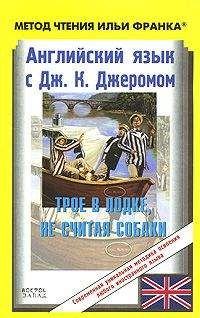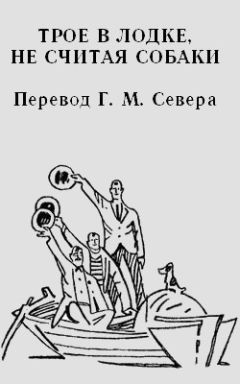Jerome Jerome - Английский язык с Джеромом К. Джеромом. Трое в лодке, не считая собаки
We grumbled a good deal. We thought he might, at least, have had it whitewashed or tarred — had something done to it to distinguish it from a bit of a wreck; but he could not see any fault in it.
He even seemed offended at our remarks. He said he had picked us out the best boat in all his stock, and he thought we might have been more grateful.
He said it, The Pride of the Thames, had been in use, just as it now stood (or rather as it now hung together) (он сказал, «Гордость Темзы» используется, в том самом /виде/, в каком она стоит сейчас /или, скорее, держится на воде/), for the last forty years, to his knowledge (последние сорок лет, насколько ему известно; to hang together — держаться сплоченно, поддерживать друг друга), and nobody had complained of it before, and he did not see why we should be the first to begin (и никто не жаловался на нее раньше, и он не понимает, почему это мы первые начали).
We argued no more (мы больше не спорили).
We fastened the so-called boat together with some pieces of string (мы связали так называемую лодку веревкой), got a bit of wall-paper and pasted over the shabbier places (достали кусок обоев и заклеили самые позорные места; shabby — поношенный; потрепанный, протертый /об одежде, мебели и т. п./; убогий, захудалый), said our prayers, and stepped on board (прочитали молитвы и ступили на борт).
They charged us thirty-five shillings for the loan of the remnant for six days (с нас взяли тридцать пять шиллингов за прокат этого ископаемого в течение шести дней; loan — заем, ссуда; что-либо, данное для временного пользования; remnant — остатки; след, пережитки); and we could have bought the thing out-and-out for four-and-sixpence at any sale of drift-wood round the coast (мы могли бы купить его целиком за четыре /шиллинга/ шесть пенсов на любой распродаже леса на берегу; to buy; out-and-out — несомненно, полностью, совершенно; drift-wood — сплавной лес; лес, прибитый к берегу).
fastened [ˈfɑ:s(ǝ)nd] remnant [ˈremnǝnt]
He said it, The Pride of the Thames, had been in use, just as it now stood (or rather as it now hung together), for the last forty years, to his knowledge, and nobody had complained of it before, and he did not see why we should be the first to begin.
We argued no more.
We fastened the so-called boat together with some pieces of string, got a bit of wall-paper and pasted over the shabbier places, said our prayers, and stepped on board.
They charged us thirty-five shillings for the loan of the remnant for six days; and we could have bought the thing out-and-out for four-and-sixpence at any sale of drift-wood round the coast.
The weather changed on the third day (погода переменилась на третий день), — Oh! I am talking about our present trip now (я говорю теперь о нашем теперешнем путешествии), — and we started from Oxford upon our homeward journey in the midst of a steady drizzle (и мы отправились из Оксфорда в обратный путь среди постоянного мелкого дождя = сопровождаемые постоянным мелким дождем; homeward — ведущий, идущий к дому; обратный).
The river — with the sunlight flashing from its dancing wavelets (река — когда солнечный свет отражается от ее танцующих волн; wavelet — небольшая волна, рябь), gilding gold the grey-green beech-trunks (золотит серо-зеленые стволы буков), glinting through the dark, cool wood paths (сверкая, бродит темными прохладными лесными тропинками), chasing shadows o'er the shallows (разгоняет тени над отмелью; to chase — гнаться, преследовать; выгонять, разгонять), flinging diamonds from the mill-wheels (бросает алмазы с мельничных колес), throwing kisses to the lilies (поцелуи посылает: «кидает» лилиям), wantoning with the weirs' white waters (резвится в вспененной воде плотин), silvering moss-grown walls and bridges (серебрит поросшие мхом стены и мосты), brightening every tiny townlet (озаряет каждый крохотный городок), making sweet each lane and meadow (делает очаровательными все дорожки и луга), lying tangled in the rushes (лежит спутанный в камышах = переплетается с камышами), peeping, laughing, from each inlet (выглядывает, смеясь, из каждой бухты), gleaming gay on many a far sail (весело блестит на дальнем парусе), making soft the air with glory (сиянием смягчает воздух; glory — триумф, великолепие; сияние, ореол) — is a golden fairy stream (золотистый сказочный поток).
meadow [ˈmedǝu] laughing [ˈlɑ:fɪŋ]
The weather changed on the third day, — Oh! I am talking about our present trip now, — and we started from Oxford upon our homeward journey in the midst of a steady drizzle.
The river — with the sunlight flashing from its dancing wavelets, gilding gold the grey-green beech-trunks, glinting through the dark, cool wood paths, chasing shadows o'er the shallows, flinging diamonds from the mill-wheels, throwing kisses to the lilies, wantoning with the weirs' white waters, silvering moss-grown walls and bridges, brightening every tiny townlet, making sweet each lane and meadow, lying tangled in the rushes, peeping, laughing, from each inlet, gleaming gay on many a far sail, making soft the air with glory — is a golden fairy stream.
But the river — chill and weary (но река — холодная и усталая), with the ceaseless rain-drops falling on its brown and sluggish waters (когда непрерывные капли дождя падают на ее хмурые медленные воды; brown — коричневый, бурый; хмурый, темный), with a sound as of a woman, weeping low in some dark chamber (с таким звуком, будто женщина плачет тихо в темной комнате); while the woods, all dark and silent, shrouded in their mists of vapour (а лес = деревья, мрачные и безмолвные, укрытые клубами сырого тумана; mist — легкий туман, мгла; vapour — пар; пары; испарения), stand like ghosts upon the margin (стоят словно призраки на берегу); silent ghosts with eyes reproachful (бесшумные привидения с укоризненным взглядом), like the ghosts of evil actions (словно призраки злых деяний; actions — действия, деятельность, поведение), like the ghosts of friends neglected (забытых друзей; to neglect — пренебрегать, игнорировать; забрасывать) — is a spirit-haunted water through the land of vain regrets (населенная духами река, /текущая/ по земле тщетных сожалений; land — земля, суша; страна, царство).
Sunlight is the life-blood of Nature (солнечный свет — это кровь Природы; life-blood — кровь; источник жизненной силы). Mother Earth looks at us with such dull, soulless eyes (Мать-Земля смотрит на нас таким безрадостным, бездушным взглядом), when the sunlight has died away from out of her (когда солнечный свет покидает ее; to die away — увядать; замирать /о звуке/). It makes us sad to be with her then (нам становится тогда грустно с ней); she does not seem to know us or to care for us (кажется, она не знает нас и не любит; to care for — заботится о, любить, питать интерес к). She is as a widow who has lost the husband she loved (она — словно вдова, потерявшая мужа, которого любила; to lose), and her children touch her hand, and look up into her eyes, but gain no smile from her (ее дети касаются ее руки и заглядывают ей в глаза, но не получают от нее ни единой улыбки).
ceaseless [ˈsi:slɪs] vapour [ˈveɪpǝ] haunted [ˈhɔ:ntɪd]
But the river — chill and weary, with the ceaseless rain-drops falling on its brown and sluggish waters, with a sound as of a woman, weeping low in some dark chamber; while the woods, all dark and silent, shrouded in their mists of vapour, stand like ghosts upon the margin; silent ghosts with eyes reproachful, like the ghosts of evil actions, like the ghosts of friends neglected — is a spirit-haunted water through the land of vain regrets.
Sunlight is the life-blood of Nature. Mother Earth looks at us with such dull, soulless eyes, when the sunlight has died away from out of her. It makes us sad to be with her then; she does not seem to know us or to care for us. She is as a widow who has lost the husband she loved, and her children touch her hand, and look up into her eyes, but gain no smile from her.
We rowed on all that day through the rain, and very melancholy work it was (мы продолжали грести весь день под дождем: «сквозь, через дождь», и это было очень тоскливым занятием). We pretended, at first, that we enjoyed it (мы делали вид сначала, что наслаждаемся им). We said it was a change, and that we liked to see the river under all its different aspects (мы говорили, что это перемена, и что нам нравится наблюдать реку во всех ее различных видах). We said we could not expect to have it all sunshine, nor should we wish it (говорили, что не можем = нельзя рассчитывать, что всегда будет солнечная погода, да мы бы и не хотели). We told each other that Nature was beautiful, even in her tears (мы говорили друг другу, что Природа прекрасна, даже в слезах).
Indeed, Harris and I were quite enthusiastic about the business, for the first few hours (и действительно, мы с Гаррисом были прямо в восторге первые несколько часов). And we sang a song about a gipsy's life, and how delightful a gipsy's existence was (и мы пели песню о цыганской жизни, о том, как она восхитительна; to sing; existence — существование, жизнь)! — free to storm and sunshine, and to every wind that blew (свободна к = открыта и буре, и хорошей погоде, и каждому ветру, который дует; to blow)! — and how he enjoyed the rain, and what a lot of good it did him (и как он наслаждается дождем, и сколько пользы дождь ему приносит); and how he laughed at people who didn't like it (как он смеется над людьми, которые не любит дождя).
George took the fun more soberly, and stuck to the umbrella (Джордж радовался сдержаннее и не выпускал из рук зонтика; to stick to — придерживаться, стараться сохранить; быть верным чему-либо).
enthusiastic [ɪn,Ɵju:zɪˈæstɪk] gipsy [ˈʤɪpsɪ]
We rowed on all that day through the rain, and very melancholy work it was. We pretended, at first, that we enjoyed it. We said it was a change, and that we liked to see the river under all its different aspects. We said we could not expect to have it all sunshine, nor should we wish it. We told each other that Nature was beautiful, even in her tears.
Indeed, Harris and I were quite enthusiastic about the business, for the first few hours. And we sang a song about a gipsy's life, and how delightful a gipsy's existence was! — free to storm and sunshine, and to every wind that blew! — and how he enjoyed the rain, and what a lot of good it did him; and how he laughed at people who didn't like it.
George took the fun more soberly, and stuck to the umbrella.
We hoisted the cover before we had lunch, and kept it up all the afternoon (мы подняли брезент, прежде чем позавтракать, и не опускали его: «держали поднятым» весь день; cover — крышка, футляр, чехол, покров), just leaving a little space in the bow, from which one of us could paddle and keep a look-out (оставив лишь небольшой промежуток на носу, через который один из нас мог грести и нести вахту; look-out — наблюдение, видимость; вахта). In this way we made nine miles, and pulled up for the night a little below Day's Lock (таким образом мы прошли девять миль и остановились на ночь немного ниже Дэйского шлюза).



